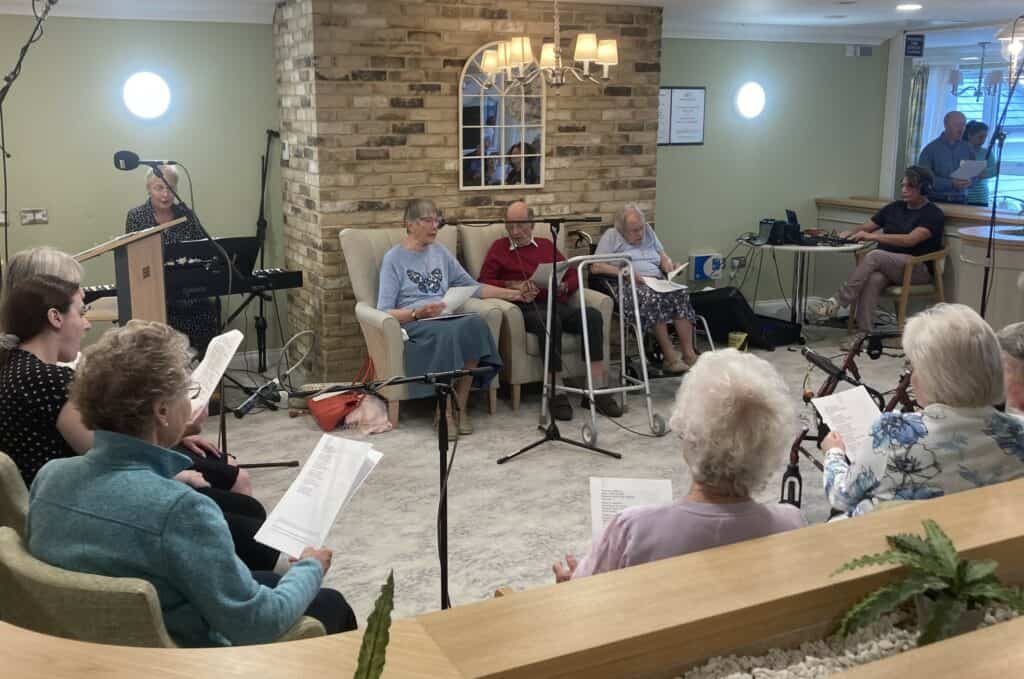10 Top Tips to help your Church support Worship in Care Homes

Author: Pilgrims' Friend Society
For older Christians living in care homes, the local church has a valuable role to play in ensuring they can enjoy a rich spiritual life. Helen Nathan from Pilgrims’ Friend Society shares insights on everything from building connections to leading services.
Back in September, our care home Middlefields House in Chippenham was featured on Radio 4’s Sunday Worship programme. “Family members” (as we call those who choose to live with us) gathered for a time of collective worship, listening to a short talk and sharing Bible passages, hymns and reflections on God’s faithfulness over the years. It was a warm and uplifting time, and a lovely glimpse of why it is so precious to worship the Lord in community with others.

Gaie Marshall is Pastoral Lead at the home and her role involves working with local churches to ensure those living at Middlefields House receive ample opportunity for spiritual encouragement. “Going to church, praying and sharing fellowship are seen as vital for the Christian life,” she says. “Nowhere in the Bible does it suggest we put a brake on it just because people are older.”
For those living in care homes getting out to church may no longer be an option for any number of reasons including ill health, lack of mobility or difficulties with transport. What churches can bring to a care home can therefore be a spiritual lifeline.
As well as provision by staff, at Middlefields House there are regular Sunday Services, a monthly Monday Communion Service, events such as ‘Songs of Praise’ and ‘Sing and Share’, and times of open worship, all supported by local churches and volunteers.
“It makes such a difference. I can think of one lady who was anxious before a recent singing time. Afterwards, she was buoyed up and talking about her joy in the Lord,” says Gaie. “The Word of the Lord is so powerful. I remember another gentleman, confused one morning but as the conversation turned to Scripture he brought out gems that were stored in his heart. That same gentleman also shared very appropriately a quote from a Christian song in a time of worship and praise.”
Whether you’re building on an existing partnership with your local care home or starting something from scratch, the below can be useful pointers:
1) Make a connection. This could be to the manager of the home, or it may be that your best contact is the activities coordinator – these are often the people responsible for organising the activities each week and overseeing volunteers.
2) Appeal to an ethos of ‘person-centred’ care. Best practice in social care means putting the individual and their needs and preferences first. The Care Quality Commission (CQC), the regulator for health and social in England, says providers should care for a person’s ‘religious and spiritual needs’. By visiting a care home, your church is helping to uphold the duty they have to any Christian residents, or any who are interested in the Christian faith.
3) Be sensitive to red tape. Care homes have a duty to safeguard those who are in their care. Be prepared to go through the process of having a DBS check/ joining their official volunteer programme to make things as easy for the home as possible.
4) Start small. At first, you might go in and simply chat, pray and read the Bible with individuals. From there, you may find the interest of other residents is piqued and they want to join in too and things will grow.
5) Keep it simple. If you are holding a service, a short talk of 10 to 15 minutes is probably enough. Visual aids can help people to engage, especially if they are living with a condition affecting cognition like dementia. Interactive elements, such as a quiz or props to handle, can also help people engage.
6) Make it musical. Music and song can reach deep into the soul and many older people in care homes today may remember old hymns from childhood. If you have someone who can provide instrumental accompaniment, then great. If not, a smart phone with a speaker is a good option, or simply sing unaccompanied. Try familiar choruses with repetition like ‘Wide, Wide As The Ocean’ or ‘Jesus Loves Me This I Know’.
7) Consider coming on a Sunday… but don’t be deterred if you can’t. For many older Christians, church on a Sunday feels right, giving them a boost and perspective to start the week. If you are a minister or pastor looking to lead a service, this may mean fitting the visit around other Sunday commitments and a monthly service might be the realistic option. Or it may be that a Sunday service just doesn’t work at all and a midweek service is better.
8) Celebrate communion. Jesus commands believers to receive communion. Some older people living care homes may only be able to live out this aspect of their faith if someone brings communion to them. Find out what your church denomination believes around the giving of the Lord’s Supper and consider whether this is something that could be made possible.
9) Don’t be put off if another church is already involved. Having people from different church backgrounds visit/ lead services at a home can help support Christians from different backgrounds who are used to different approaches and styles of worship.
10) Pray. Last but by no means least! God can open doors anywhere, so commit your plans to the Lord and see what happens. Ask if prayer for local care homes could be added to your church’s prayer rota, or if you could have a slot at an upcoming prayer meeting to tell others about any plans and pray over them as a church.

If you have other Top Tips to share with us out of your own experience with care home ministry, we’d love to hear from you! Email us at churchchampions@faithinlaterlife.org
